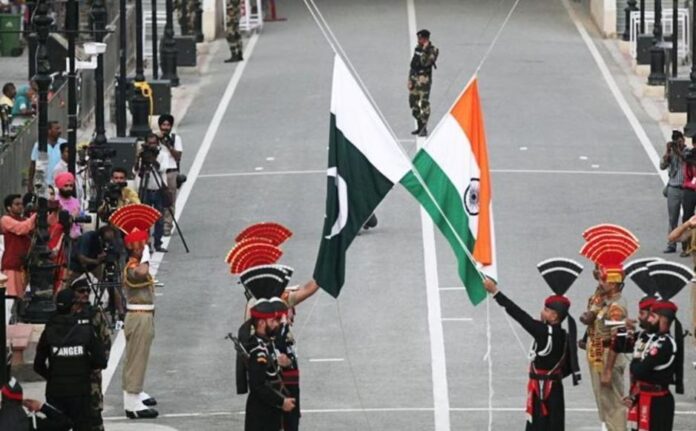New Delhi – In a sweeping response to the devastating terror attack in Pahalgam that claimed 26 lives, India has drastically downgraded diplomatic relations with Pakistan, expelled Pakistani military attaches, suspended the 1960 Indus Waters Treaty, and shut down the Attari-Wagah land border crossing. The measures, announced late Wednesday, mark a significant escalation in tensions between the nuclear-armed neighbors.
The decisions were finalized during a two-and-a-half-hour meeting of the Cabinet Committee on Security (CCS), chaired by Prime Minister Narendra Modi. The CCS condemned the attack, which killed 25 Indian citizens and one Nepali national, and vowed to bring the perpetrators and their sponsors to justice.
Also Read: Bollywood Reacts to Pahalgam Tragedy: ‘This Cannot Be Forgiven’
Suspension of Indus Waters Treaty
The Indus Waters Treaty, brokered by the World Bank in 1960, governs the sharing of six rivers in the Indus Basin. India controls the eastern rivers (Sutlej, Beas, Ravi), while Pakistan relies heavily on the western rivers (Indus, Jhelum, Chenab), which supply 70% of its water needs. Foreign Secretary Vikram Misri announced that the treaty will be held in abeyance until Pakistan “credibly and irrevocably abjures its support for cross-border terrorism.”
The suspension threatens Pakistan’s agricultural heartlands in Punjab and Sindh, which depend on these rivers for irrigation. Experts warn that blocking or restricting water flows could lead to severe crop failures, food insecurity, and economic turmoil in Pakistan.
Closure of Attari-Wagah Border Crossing
India has also closed the Integrated Check Post at Attari, the only operational land border crossing between the two nations, with immediate effect. The Wagah crossing facilitated trade in goods like agricultural products and cement. Its closure forces Pakistan to seek costlier trade routes through third countries, further straining its economy. Those with valid travel endorsements may return via Attari before May 1, Misri clarified.
Diplomatic Expulsions and Reductions
India has declared Pakistani defense, military, naval, and air advisors in New Delhi “Persona Non Grata,” giving them one week to leave. India will reciprocally withdraw its own advisors from Islamabad. Both countries will reduce their high commission staff from 55 to 30 by May 1, and five support staff for service advisors will be withdrawn from each mission. Pakistani nationals are also barred from traveling to India under the SAARC Visa Exemption Scheme, with all previously issued visas canceled.
Response to Pahalgam Attack
The CCS was briefed on the “cross-border linkages” of Tuesday’s attack in Pahalgam, which targeted civilians in Jammu and Kashmir. Misri noted that the attack followed successful elections in the Union Territory and its progress toward economic development. The CCS condemned the strike in the “strongest terms,” expressing condolences to the victims’ families and wishing for the speedy recovery of the injured.
“Strong expressions of support and solidarity have been received from many governments worldwide, reflecting zero tolerance for terrorism,” Misri said. He emphasized India’s resolve to pursue justice, citing the recent extradition of Tahawwur Rana as an example of its unrelenting stance against terrorism.
Security Measures and Global Condemnation
The CCS directed security forces to maintain high vigilance and reviewed the overall security situation in the region. Misri underscored that India will hold both the perpetrators and their sponsors accountable, signaling a robust response to any further provocations.
The international community has widely condemned the Pahalgam attack, with governments expressing solidarity with India. The CCS expressed appreciation for these sentiments, reinforcing the global consensus against terrorism.
A New Low in India-Pakistan Relations
The retaliatory measures dismantle the few remaining diplomatic and economic links between India and Pakistan, plunging bilateral relations to a new low. With the Indus Waters Treaty suspended, the Attari border closed, and diplomatic channels curtailed, the two nations face heightened tensions that could have far-reaching consequences for the region.
India’s actions signal a firm stance against cross-border terrorism, but they also raise concerns about the humanitarian and economic fallout in Pakistan, particularly in its water-scarce agricultural regions. As both countries brace for the next steps, the international community watches closely, urging restraint to prevent further escalation.
Key Points: India’s Response to Pahalgam Terror Attack
- Diplomatic Downgrade: India reduces Pakistan and India high commission staff from 55 to 30 by May 1, expels Pakistani military attaches, and withdraws Indian advisors from Islamabad.
- Indus Waters Treaty Suspended: The 1960 treaty, governing six Indus Basin rivers, is held in abeyance until Pakistan stops supporting cross-border terrorism, threatening Pakistan’s agriculture with water shortages.
- Attari-Wagah Border Closed: The only land border crossing shuts immediately, cutting off trade in goods like agriculture and cement; valid travelers can return by May 1.
- Pahalgam Attack Context: The attack killed 26 (25 Indians, 1 Nepali) and was linked to cross-border terrorism, following Jammu and Kashmir’s successful elections.
- Security and Justice: The CCS, chaired by PM Modi, directs forces to maintain high vigilance, vows to bring perpetrators and sponsors to justice, and notes global condemnation of the attack.
- Visa Restrictions: Pakistani nationals barred from SAARC Visa Exemption Scheme; all prior visas canceled.
- Global Support: International governments condemn the attack, expressing solidarity with India’s zero-tolerance stance on terrorism.



